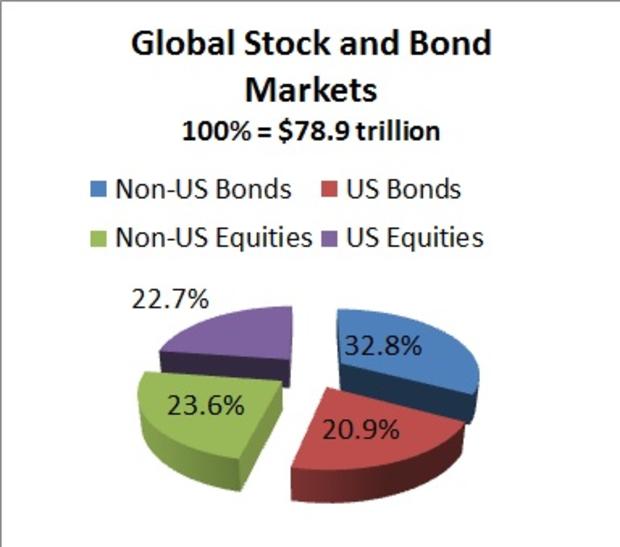Vanguard's new int'l bond fund: Should you invest?
(MoneyWatch) Vanguard, the world's largest mutual fund company, launched its much anticipated Total International Bond Fund (VTABX) in May. Is it a good investment?
Vanguard makes the case for international bonds in a paper back in 2011. Between U.S. and international stocks and bonds, it's the single-largest asset class, representing 33 percent of global stocks and bonds. Vanguard notes that overall historic portfolio volatility has been slightly lower with the use of international bonds.
The Admiral and ETF share classes of this fund have a 0.20 percent annual expense ratio. There is an additional cost to hedge to the U.S. dollar of about 0.05 percent annually. Vanguard appears committed to this new fund, as it has included the product in its fund of funds. That includes its target date retirement funds, where it now represents 20 percent of the bond portfolio, with its Total Bond Fund representing the other 80 percent for most of these funds.
Investors can benefit from global equities, and in theory that also applies to global bond investing. But theory and reality don't always align. Because the role of fixed income is to act as the portfolio's shock absorber, Vanguard's decision to hedge to the U.S. dollar makes sense. Unhedged international bond funds act more as a foreign currency bet than a bond fund.
The only reason to bypass international bonds in the past was the high costs. Vanguard's new fund is clearly the lowest cost, diversified and U.S. dollar-hedged bond fund in the market. The total costs of this share class with hedging costs are about 0.25 percent, compared to the same Admiral share class U.S. Total Bond fund (VBTLX) of 0.10 percent. This is roughly equivalent to the differentials of the equivalent total stock funds.
All sounds pretty good so far. But a comparison of the SEC 30-day yields and the interest rate risk of the two funds as of Sept. 27 gives pause. The interest rate risk is measured by the funds' durations. So, for example, a one percentage point increase in interest rates would cause a bond fund with a five-year duration to decline by five percent.
Vanguard Total Bond fund Admiral - 2.12 percent yield, 5.5 year duration
Vanguard Total International Bond Admiral - 1.76 percent yield, 6.6 year duration
Since the yield is the expected return over the next year, the international bond fund seems to have a lower expected return, as well as more interest rate risk. And because 67 percent of that bond fund is backed by the U.S. government, diversifying to lower default risk is of less concern in this case. If the U.S. does ever default on its obligations, no investment is likely to be worth anything. This left me unenthused about buying and recommending this fund.
Fran Kinniry, a principal in Vanguard's strategy group, strongly disagreed with my assessment of the company's new product. He stated that sacrificing a bit of yield was well worth the benefit of diversifying in the world's largest asset class, and doing so in a fund that invests in over 50 countries and 1,896 different bonds justified its inclusion in a portfolio. While he agreed that yield was the best forecast of expected return, he noted the variations were wide and stated that, in spite of its lower yield, the international fund had bested the U.S. counterpart's total return by 0.61 percentage points between May 31 and Sept. 26. Of course, he stated that this is a short period of time and not indicative of which will do better going forward.
Kinniry also noted that 78 percent of this bond fund is backed by governments, about 11 percentage points higher than the U.S. fund.
Though I rarely have a hard time deciding whether an investment is appropriate for a portfolio, this is clearly an exception. I strongly believe that the expected return is yield minus any default and that argues against including this international bond fund. Investors should beware of taking on more interest rate risk for lower return. Credit risk is also of less concern with so much of the U.S. bond fund backed by the government. But I also wrestle with the fact that excluding this asset class is to say I think I'm smarter than the market, which I'm not.
So my decision was to put my toe in the water. Last week, I bought a little VTABX for my own portfolio. I'm not ready to recommend this fund for my clients, as I want to study it a bit longer. This isn't exactly a glowing recommendation, but it's not a thumbs down, either.
